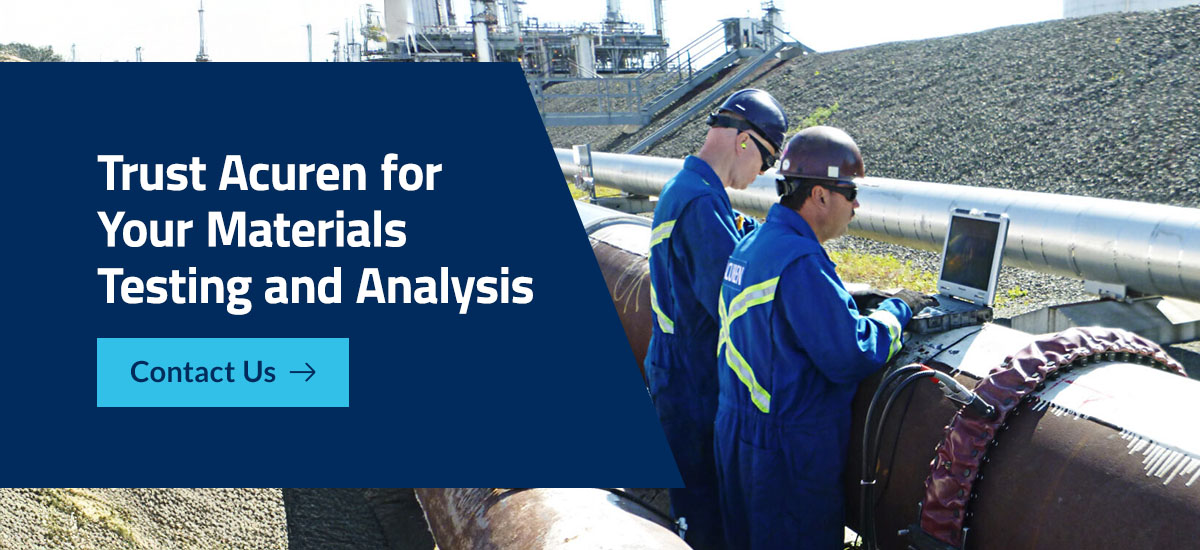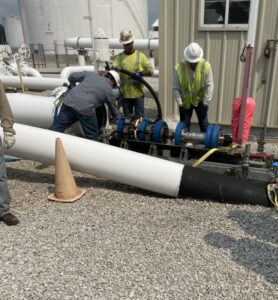
Many industries use materials testing and analysis to ensure product safety and quality. Testing evaluates material properties and behaviors under various conditions, providing information on performance, durability and reactivity. Materials testing can be conducted on raw materials, parts or finished products.
Learn about the importance of materials testing, including what it is, different types of tests and the industries that benefit from this type of testing.
What Is Materials Testing?
Materials testing is the process of evaluating the performance and properties of materials in various conditions. This testing ensures materials are suitable for their applications and meet relevant standards. Tests often evaluate durability, strength and performance. Testing can determine:
- Mechanical properties: Characteristics such as strength, hardness and toughness.
- Physical properties: Characteristics such as density, thermal conductivity and corrosion resistance.
- Chemical properties: To confirm or identify material composition to a certification or standard.
- Behavior in different environments: How a material reacts in different service conditions, such as extreme temperatures or marine environments.
Materials testing is a respected and established technique that is essential for asset integrity.
Types of Materials Testing
Different tests are required to test different properties. Some common types of materials testing include:
- Tensile testing: A type of mechanical testing, tensile testing measures a material’s strength, elasticity and ability to sustain deformation under stress by stretching a material until it breaks.
- Hardness testing: These tests measure how well the material resists deformation, often after being subjected to a particular condition, such as a heat treatment or thermal processing.
- Corrosion testing: These tests determine how well materials resist degradation due to chemical environments, such as salt spray tests or immersion tests.
- Metallography testing: Cross-sectioning a part or material and examining it under an optical microscope to confirm microstructure, heat treatment or coating processes.
Other tests include:
- Charpy V-notch impact testing
- Fatigue testing
- Fracture toughness testing
- Water analysis
- Bend testing
The right test depends on what information is required to better understand a material and its properties. It is essential to identify the specific properties that need to be evaluated to later compare to requirements like compliance standards.
Why Is Materials Testing Important?
While materials testing is performed for many reasons, the most important reason to test materials is for safety. Materials testing also helps ensure suitability and quality in various applications. Many industries require testing to comply with applicable laws and regulations.

- Safety: Products used in critical applications could cause damage, injury or death if they fail. Testing prevents failures by confirming the materials can withstand the expected conditions.
- Suitability: Testing helps manufacturers determine whether a material or product is suitable for its intended application and can help them choose a material or a supplier. These tests can also verify whether a material from a new supplier is what was ordered.
- Regulatory compliance: Regulatory bodies or government entities require certain products to meet specific standards. Testing makes sure products meet industry standards and regulations, keeping people safer.
- Quality control and assurance: Regular testing helps with quality consistency. If there are defects or irregularities, frequent testing can identify them in the manufacturing process, preventing poor-quality parts from being used in critical applications and reducing the risk of material failures.
- Product design and improvement: Many businesses use materials testing when choosing a material for a new product or a new version of an existing product.
The Benefits of Material Testing and Analysis
Performing material testing and analysis provides several benefits. Here are some of the primary advantages:
- Cost savings: Testing minimizes the risk of material failure, preventing costly downtime, repairs and liability issues. It can inform better material choices and optimize operations, which can reduce costs if materials that perform better are within budget.
- Improved asset longevity: Optimizing materials with longer life spans means extended life spans for the equipment made from those materials.
- Reliability and customer confidence: Testing assures customers that the materials selected are reliable, improving brand loyalty and reputation. Materials certified through third-party testing can increase product marketability.
- Improved operational efficiency: Testing can identify material quality issues before put into service, enhancing operations by reducing waste and downtime and increasing yields.
- Research and development: Testing can be instrumental in developing new materials or technologies. Data from tests makes it easier to compare new and existing materials, identifying areas for improvement and current strengths.
Industries That Benefit From Materials Testing
Most industries benefit from some type of materials testing. Here are a few examples:
- Aerospace: Testing often involves examining lightweight materials for strength and durability under extreme conditions.
- Automotive: Tests evaluate materials in vehicle components for reliability and performance, including strength and fatigue resistance. Testing can also assess emissions from vehicles and manufacturing processes.
- Building and infrastructure: Testing confirms building materials like steel meet safety standards by evaluating tensile strength, durability and thermal transfer.
- Manufacturing: Like the automotive industry, general manufacturing companies use material testing to assess products for reliability and performance.
- Oil and gas: Materials used in drilling equipment, pipelines and tanks require testing to ensure their durability and corrosion resistance.
- Pulp and paper: Materials testing in this industry cover the quality of raw materials and finished products. Testing can evaluate vessels and chemicals used to produce paper products. Tests can also assess emissions and chemical waste to verify compliance with applicable regulations.
Trust Acuren for Your Materials Testing and Analysis
If your company needs material testing, consider Acuren. We are an industry-leading provider of materials testing and analysis. Our labs in Canada are ISO 17025 certified, with some locations accredited to Nadcap and Canadian Controlled Goods Program. Some of our specialized tests include National Association of Corrosion Engineers sour service tests, weld procedure tests and valve certification.
We have over 40 years of testing, inspection and certification experience and more than 100 locations nationwide. Our experts provide reliable engineering solutions to help your business reduce risks, enhance efficiency and optimize costs. To learn more about how we can help your business or to request a quote, contact Acuren today!





